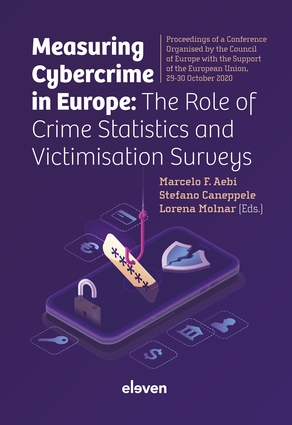
Sign up today...
for featured titles, special offers, bestsellers, and more, in your inbox!


SOCIAL SCIENCE
154 Pages, 6.5 x 9.45
Formats: Cloth
Cloth, $70.99 (CA $94.99) (US $70.99)
Publication Date: June 2022
ISBN 9789462362451
Rights: US & CA
Eleven International Publishing (Jun 2022)
This title is also digitally accessible through Open Access. Follow this link to view the publication.
Cybercrime has become part of everyday life. We live in hybrid societies, fluctuating between the material and the virtual world, and we are hence confronted with online, offline and hybrid offences. However, the few victimisation surveys conducted in Europe reveal that victims of online crimes seldom report them to the police. Consequently, cybercrimes – which according to the best estimates represent between one third and more than half of all attempted and completed crimes in Europe – seldom appear in national criminal statistics. The State seems powerless to prevent them and private security companies flourish.
During two days, experts from all over the continent gathered together in the framework of a virtual conference organized by the Council of Europe and the European Union to discuss what we know, what we do not know, and what we could do to improve our knowledge of crime in our contemporary hybrid societies, develop evidence-based criminal policies, provide assistance to crime victims, and implement realistic programs in the field of crime prevention and offender treatment. This book presents their experiences, reflexions, and proposals.
Marcelo F. Aebi, PhD, is Professor of Criminology at the University of Lausanne, Switzerland. He is also a consultant expert of the Council of Europe, head of the European Sourcebook Group, executive secretary of the European Society of Criminology and chair of the Scientific Advisory Board of the Netherlands Institute for the Study of Crime and Law Enforcement (NSCR). He publishes regularly in scientific journals in English, French, Spanish and Italian. https://orcid.org/0000-0002-3449-1093.
Stefano Caneppele, PhD, is Professor of Criminology at the University of Lausanne, Switzerland. Among his research domains, he is interested in the study of the interaction between technology, crime and its social reaction. He is also a consultant expert of the Council of Europe and member of the European Sourcebook Group of Crime and Criminal Justice Statistics. https://orcid.org/0000-0003-3924-4937.
Lorena Molnar, MA, is a PhD candidate and research assistant at the University of Lausanne, Switzerland. Her main domains of interest are comparative criminology, innovation in methods and hard-to-reach vulnerable populations. She is a member of the SPACE (Statistiques Pénales Annuelles du Conseil de l’Europe) team and of the European Sourcebook Group and co-author of the sixth edition of the European Sourcebook of Crime and Criminal Justice Statistics. https://orcid.org/0000-0001-8692-9256.